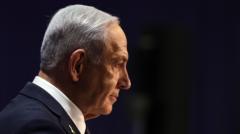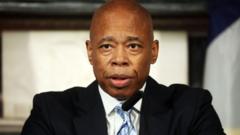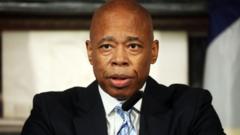As the investigation into alleged ties between his aides and Qatar unfolds, Israeli Prime Minister Benjamin Netanyahu strongly criticizes the charges, describing them as politically motivated. Two key aides were arrested, sparking accusations of a political smear campaign.
Netanyahu Denounces Qatar Probe As Political Vendetta Amidst Rising Tensions

Netanyahu Denounces Qatar Probe As Political Vendetta Amidst Rising Tensions
Israeli PM Benjamin Netanyahu labels a police investigation into his aides' connections with Qatar a "witch hunt," dismissing claims of alleged wrongdoing.
Israeli Prime Minister Benjamin Netanyahu has vociferously condemned an ongoing police investigation into possible connections between his aides and the Gulf nation of Qatar, labeling it a "witch hunt." This statement comes after he provided recorded testimony to authorities regarding allegations of impropriety involving his close associates.
Two individuals linked to Netanyahu, identified as Yonatan Urich, a senior adviser, and Eli Feldstein, a former spokesman, were detained on Monday amid accusations of receiving illicit payments from Qatari sources. Both have denied any wrongdoing. Despite not being named as a suspect, Netanyahu criticized the police, alleging that they were holding his aides "as hostages." In a video message following his questioning, he asserted, "There is no case," and characterized the investigation as politically motivated.
Qatar has similarly dismissed the allegations as part of a smear campaign against it, especially given its role as a mediator in the Israeli-Hamas conflict during the ongoing war. The investigation, informally dubbed "Qatar-gate," arrives at a particularly tumultuous time in Israel, where Netanyahu faces intensifying protests over his governmental policies and decisions.
On the same day the arrests were made, the Israel Police announced the detentions without providing explicit details due to a court-ordered gag. Media outlets later disclosed that Urich and Feldstein stand accused of cooperating with a foreign agent and engaging in activities such as money laundering and bribery. Following his interaction with law enforcement, Netanyahu briefly cut short his participation in another corruption trial of his own.
In his online video, he detailed his belief that the inquiry was primarily of a political nature, emphasizing how deeply the situation affected Urich and Feldstein. The Likud party, which Netanyahu heads, issued a statement criticizing the attorney general's office and law enforcement, accusing them of manipulating the situation to compel false testimony against the prime minister through intimidation tactics.
On Tuesday, a judge authorized an extension of the detention for both aides, citing significant suspicions that warranted further investigation. The judge mentioned that Urich and Feldstein allegedly provided favorable portrayals of Qatar while undermining Egypt's role in the broader peace talks, stemming from connections tied through a U.S. lobbying firm.
This incident adds layers to an already complex political landscape for Netanyahu, who has faced backlash over various aspects of his leadership, including military strategies and judicial reforms. Following these events, Netanyahu attempted to reverse an initial decision regarding the appointment of a new chief of the Shin Bet security agency after criticism surfaced regarding the nominee's involvement in protests against his policies.
Qatar's historical support for the Palestinian cause and its ties with Hamas further complicate the narrative, as allegations of financing conflicts and political machinations come to light. The nation has faced similar accusations in the past but continues to play a crucial mediating role in the ongoing regional crisis. Amidst these developments, Netanyahu's assertions regarding the investigation's motives signal a deepening chasm in Israeli political discourse and the dynamic nature of international alliances amid conflict.





















